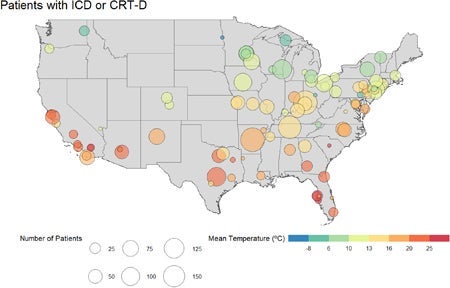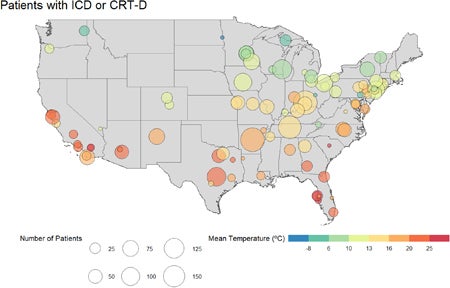Extreme Heat Could Increase Risk of AFib in Patients with Implanted Devices

November 14, 2024 – A recent study co-authored by Dr. Barrak Alahmad and Dr. Petros Koutrakis explored the relationship between extreme heat and atrial fibrillation in patients with implanted cardiac devices. The study, to be presented at the American Heart Association’s Scientific Sessions 2024 on November 16-18, 2024, in Chicago, found that extreme temperature spikes could double or even triple the risk of irregular heart rhythms (atrial fibrillation) in patients with implanted defibrillators.
For the study, the health data of over 2,000 people with implanted defibrillators was surveyed and then compared to the hourly temperature of the location where the device was implanted. Patients surveyed had an implanted cardioverter-defibrillator (ICD) or cardiac resynchronization therapy defibrillator (CRT-D) in order to regulate and monitor their heartbeats. It was found that patients that experienced temperatures of over 100-degree Fahrenheit were 2-3 times more likely to have an AFib event than those that experienced lower temperatures. Patients that experienced temperatures between 41- and 46-degrees Fahrenheit were least likely to have an AFib event.

Figure 1. Distribution of geographical locations of the cohort of patients with implantable devices in the US (2016-2023) (Alahmad et al.)

Figure 2. Pooled dose-response relationship of ambient temperature and odds ratio of atrial arrhythmias among patients with implanted devices in the US (2016-2023) (Alahmad et al.)
The American Heart Association estimates that over 12 million people will be living with atrial fibrillation (AFib) by 2030. “AFib is becoming more prevalent both in the U.S. and globally, with its incidence rising at an alarming rate,” stated Dr. Alahmad. Therefore, studies like these that explore environmental exposures and their relationships with AFib are essential. Although this study may be the first to explore AFib and extreme heat, it is not alone in linking adverse heart events to heat stress. As climate change causes temperatures to become more extreme, it is important to know how that will impact patients.
Researchers advise that patients should work to prevent exposures, such as extreme heat, that may trigger an AFib event. This means that patients should seek air-conditioned spaces and stay hydrated when facing extreme heat.
You can read more about the study in the AHA press release and AHA News article.


